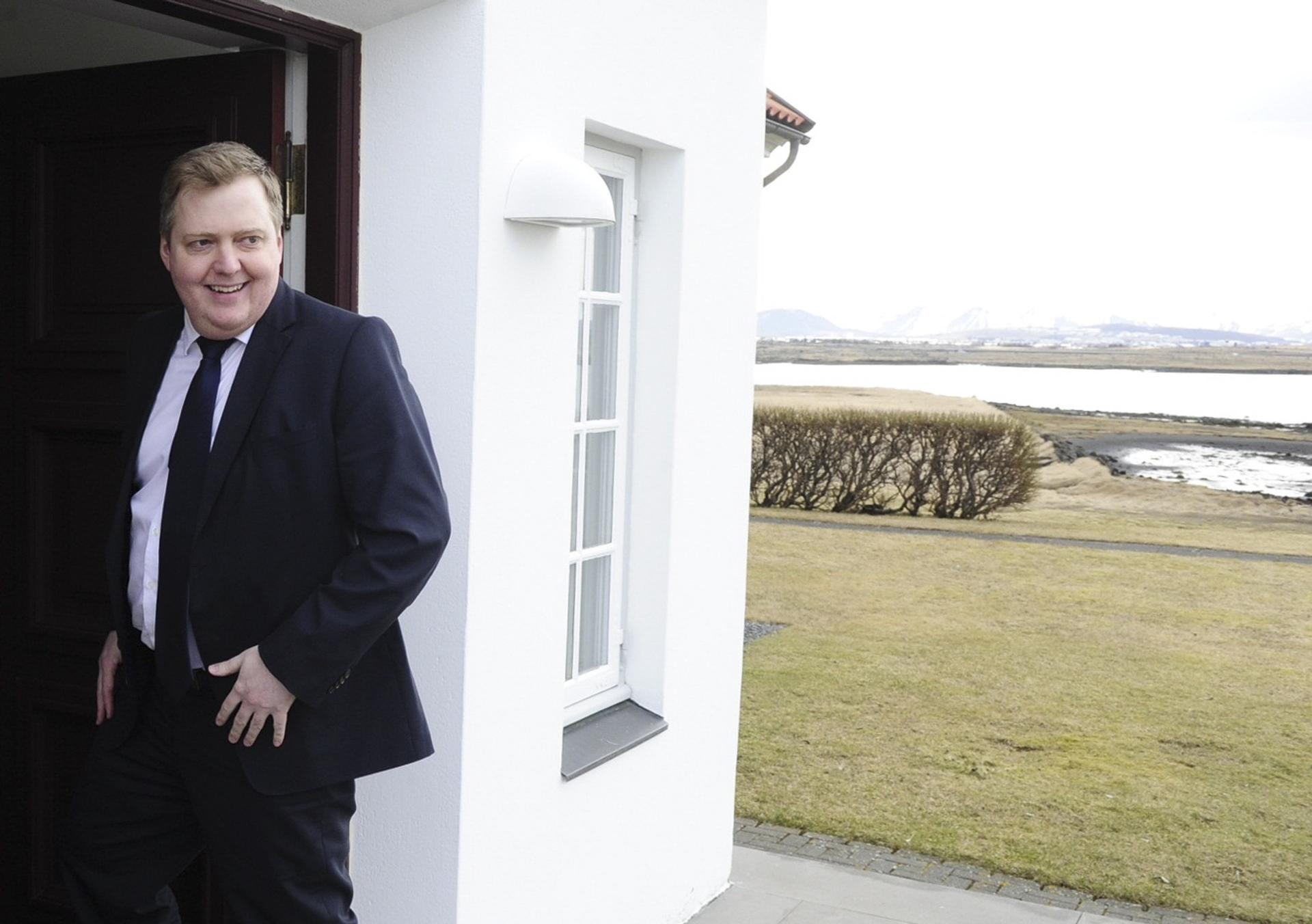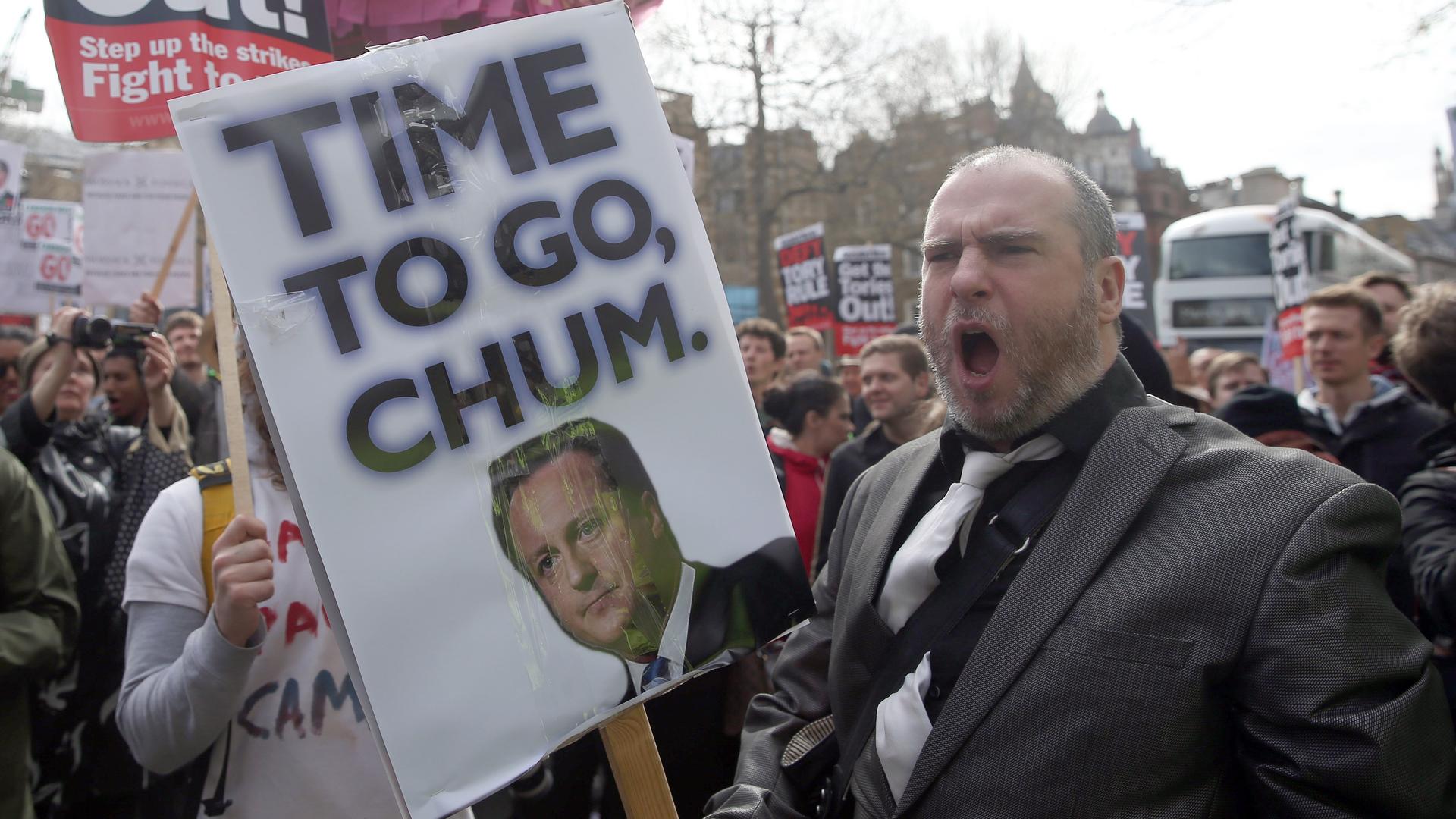The fallout: Huge Panama Papers investigation yields more casualties
Demonstrators hold placards during a protest in London on April 9, 2016. British Prime Minister David Cameron said on Saturday he should have handled scrutiny of his family's tax arrangements better and promised to learn the lessons after days of negative media coverage and calls for his resignation.
The Panama Papers are still dominating headlines, and for good reason. The massive data leak is revealing how the world's most powerful people and institutions stash their cash in offshore companies and accounts.
And the question on a lot of minds is now: Where's the accountability?
Offshore banking is perfectly legal — as long as you're not violating any of your home nation's tax regulations. But it also happens to be the preferred method of banking for criminals, drug cartels, sketchy oligarchs, sanctions dodgers and tax evaders. So naturally, while there's no proof of criminal wrongdoing in the leak, when the name of a world leader or public figure shows up, it raises eyebrows.
It's too early to know what the total fallout of the Panama Papers will be. But protesters are hitting the streets, investigations are opening, and heads are starting to roll.
We'll keep you updated as it all goes down. Stay tuned. There's more to come.
David Cameron releases tax returns, faces Parliament after weekend protests
It was a rough weekend for British Prime Minister David Cameron, and Monday wasn't much better.
On Thursday, Cameron admitted that he profited from a company his late father had set up in the British Virgin Islands. The Panama Papers leak revealed the existence of the offshore company, which paid zero UK taxes despite being run largely from the UK, and Cameron evaded questions about his connection to it for days before disclosing his former shares. (See separate item below for more).
Then came the backlash. The hastag #resigncameron trended on Twitter and thousands of protesters demonstrated outside his residence at 10 Downing Street on Saturday. Some wore Panama hats. Others held signs that read "Cameron must go."
Cameron responded on Sunday by releasing summaries of his tax returns for the past six year. And on Monday, he faced lawmakers in the House of Commons for the first time since the Panama Papers revelations. He apologized for the disclosure delay and proposed new criminal penalties for tax evasion.
That wasn't enough for some of his critics. Labor Party leader Jeremy Corbyn, who has already demanded an independent investigation into tax evasion in the UK, called Cameron's statement a "masterclass in the art of distraction," and told the prime minister, "I'm honestly not sure that you fully appreciate the anger that is out there over this injustice."
“A tax task force reporting to the chancellor and the home secretary, both members of a party funded by donors implicated in the Panama leaks, will neither be independent nor credible,” he said.
Another Labor MP, Dennis Skinner, piled on. He was ejected from the chamber after referring to Cameron as "Dodgy Dave."
France raids Societe Generale
French tax authorities searched the offices of a banking and financial services company, Societe Generale, on Sunday. Records from Mossack Fonseca revealed that Societe Generale had used the firm to set up 979 offshore accounts.
Salvadoran authorites raid Mossack Fonseca offices
As of Saturday, the Panama City headquarters of Mossack Fonseca hadn't been approached by investigators, according to founding partner Ramon Fonseca.
Things were less quiet at the firm's office in El Salvador. Investigators seized computers and documents from Mossack Fonseca's office in the capital city of San Salvador on Friday after getting word that the office had taken down its sign.
"At this moment we cannot speak about [any] crimes; all we can do at this moment is our job," Attorney General Douglas Melendez said.
Argentina's president appears before judge as federal prosecutor calls for investigation
“I have acted in accordance with the law and have nothing to hide,” Argentine President Mauricio Macri said during a news conference on Thursday.
Now, he's telling that to a judge.
Mossack Fonseca records show that between 1998 and 2009, Macri was a director of Fleg Trading Ltd., a company owned by his father and incorporated in the Bahamas. Macri failed to list the company in financial declarations when he became mayor of Buenos Aires in 2007 and when he became president in 2015.
An Argentine federal prosecutor, Federico José Delgado, is now seeking to open a criminal investigation into Macri's financial dealings.
Macri plans to appear before a judge on Friday. He'll ask the court to confirm that his asset declarations were in order because he never had a financial stake in Fleg Trading.
David Cameron admits profiting from his father's offshore company
British Prime Minister David Cameron spent most of the week avoiding or partially answering questions about whether he profited from an offshore investment fund owned by his father. On Thursday, Cameron admitted that he did.
The Panama Papers showed that the prime minister's late father, Ian Cameron, set up Blairmore Holdings Inc. in the Bahamas in the 1980s. That arrangement helped Blairmore avoid paying any UK taxes, even though it was largely managed within the UK.
oembed://https%3A//www.youtube.com/watch%3Fv%3DIbJalO1R–4
At first, Downing Street called it a "private matter." After a speech in Birmingham on Tuesday, Cameron was asked by a Sky News journalist whether he had profited in the past or would profit in the future from Blairmore. He avoided answering that question directly, but did say:
“In terms of my own financial affairs, I own no shares. I have a salary as prime minister and I have some savings, which I get some interest from, and I have a house, which we used to live in, which we now let out while we are living in Downing Street and that’s all I have,” the prime minister said in Birmingham. I own no shares, no offshore trusts, no offshore funds, nothing like that. And, so that, I think, is a very clear description.
Cameron admitted on Thursday that he and his wife once owned shares in the fund. He sold the shares in 2010 for around £30,500 before he became prime minister.
FIFA ethics judge resigns; Swiss authorities raid UEFA offices
Juan Pedro Damiani, a Uruguayan lawyer, resigned on Thursday from his position as an ethics judge for world soccer body FIFA. The Mossack Fonseca records linked him to offshore accounts and companies associated with three people indicted in FIFA's ongoing bribery scandal.
That news came after Swiss authorities raided the offices of Europe's soccer body, UEFA, on Wednesday. The Panama Papers revealed that UEFA's former legal director, Gianni Infantino, who is now president of FIFA, signed off on a sale of broadcasting rights to two businessmen who have been indicted by the US Department of Justice as part of the massive FIFA probe. But this isn't FIFA's first scandal.
France adds Panama to its list of uncooperative tax havens
French Finance Minister Michel Sapin announced on Tuesday that Panama will once again be placed on France's list of countries that fail to combat tax evasion. French tax regulations disincentivize companies and individuals from entering into financial transactions with countries on the list of Uncooperative States and Territories.
Panama got itself removed from the list in 2012 after convincing France it would crack down on tax dodgers.
"Panama is a country that wanted us to believe that it could respect the main international tax principles and thus it was taken off the tax haven blacklist," Sapin said. "France has decided to add Panama back on the list of uncooperative countries with all of the consequences that that will have for those who have dealings with Panama."
Prime minister of Iceland resigns
The Panama Papers have claimed their first head of state.
Iceland Prime Minister Sigmundur David Gunnlaugsson resigned on Tuesday after the leak revealed that he and his wife had purchased a company in the British Virgin Islands in order to manage her inheritance. They bought the company in 2007, right around the time Gunnlaugsson was encouraging Icelanders to help prop up the country's fragile banking system by keeping their money at home. The news inspired massive protests in the capital, Reykjavik.

“But the bigger question, really, is why [has] the prime minister … for years, been acting in contradiction to his own economic policies?” Reykjavik Grapevine news editor Paul Fontaine told PRI's The World. “And why did he keep all this to himself until he was forced to reveal his interests?”
Head of Transparency International in Chile steps down
Gonzalo Delaveau, president of Transparency International's Chilean branch, resigned on Monday. The Panama Papers linked him to at least five offshore companies.
The anti-corruption watchdog said the following in a statement on its website:
We are deeply troubled by what has happened with the Chair of our chapter in Chile. At Transparency International we stand for transparency and integrity above all else and once we learned of Delaveau’s involvement with secret companies, our International Board began the process of suspending the chapter before possible dis-accreditation. With Delaveau’s resignation our Board decided to halt its efforts to sanction the chapter.
While Delaveau is not reportedly accused of illegal activity, and he may be able to explain his activities, for us that is not the point. Not all secret companies are illegal, but many are used to hide money flows and to support acts of corruption. As we said yesterday in a press release about the Panama Papers investigation: Transparency International wants public registers of all companies' beneficial owners to make it harder for the corrupt to hide their illicit wealth in secret companies and trusts that use nominees to register ownership.
Nations open investigations
The Panama Papers provide 11.5 million files that investigators are searching for signs of crime. The US Department of Justice said it was investigating.
“We are aware of the reports and are reviewing them," said Peter Carr, spokesman for the Justice Department. "While we cannot comment on the specifics of these alleged documents, the US Department of Justice takes very seriously all credible allegations of high-level, foreign corruption that might have a link to the United States or the US financial system."
Every day, reporters and producers at The World are hard at work bringing you human-centered news from across the globe. But we can’t do it without you. We need your support to ensure we can continue this work for another year.
Make a gift today, and you’ll help us unlock a matching gift of $67,000!
